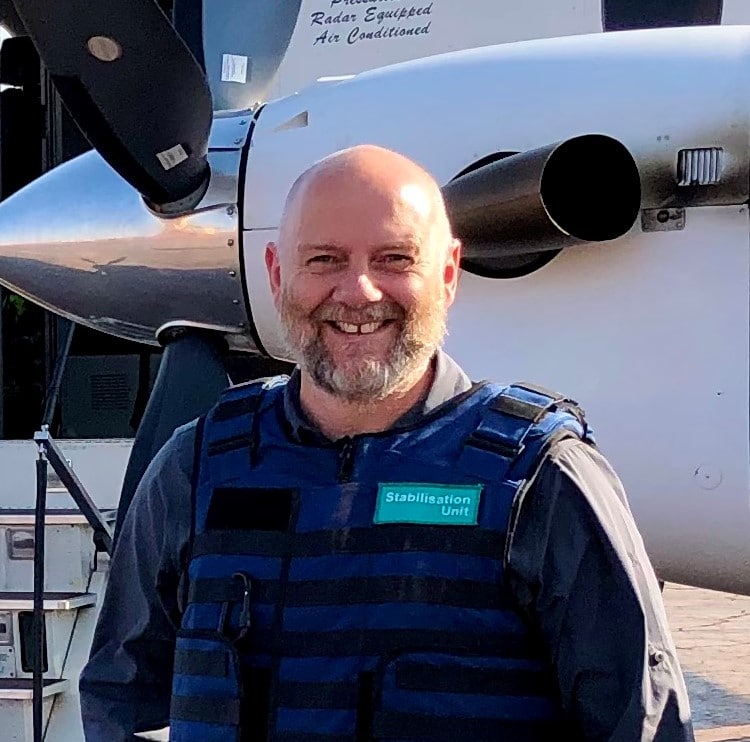
Student stories: Richard Alexander Spence, Sustainable Development MSc (online)
Our online Sustainable Development MSc empowers students to contribute effectively to the realisation of the Sustainable Development Goals (SDGs) through widespread sustainability transformations.
We caught up with Richard Alexander Spence, one of our online students who a former British Army Officer and is now a Stabilisation Consultant for the UK Government’s Office for Conflict, Stabilisation and Mediation (OCSM). Here’s what he had to share about his experience studying so far:
Why did you choose to study online with the University of Sussex?
The University of Sussex holds a reputation as one of the leading educational institutions with research being internationally recognised. This was very important in my line of work in multinational stabilisation missions, where I transition among various partners, donors and agencies. As a former military officer, I didn’t have an opportunity (or the time) to progress through the world of academia and currently find myself in a working environment alongside epistemic communities who possess some serious academic qualifications in their respective fields. In this context, it is important for me to align my operational experience with the education I am receiving from teachers and researchers, who work at the forefront of their fields.
Why did you choose to study Sustainable Development MSc (online)?
My principle task/job involves advising partners on the application of Human Security considerations during security and defence operations. As such, it was important that I demonstrated the need to address the root causes of conflict, as much as protection of civilians during the conflict itself. Being highly multidisciplinary in content, the MSc in Sustainable Development was the perfect course to ensure I gained cross cutting knowledge of the main drivers for conflict. This allows me to adopt a more wholistic approach during my advisory capacity.
What’s been your favourite module so far and what made it so engaging?
I think they have all been superb and the knowledge I have gained has really surpassed my expectations. I guess Globalisation and the Environment was right up there as one that made me really pause and consider the upstream impact of how we conduct our lives in the Global North. The deep dive into political economy and ecology while covering issues such as climate change, waste, energy and food scarcity really brought home the need to understand the relationship between globalisation and the environment. However, I must also give a shout out to the Science, Technology and Innovation module, which really took me out of my comfort zone and on a journey into a world I had never been exposed to.
How have you found online learning?
I did my MBA a few years back when I was in the army and the online experience made me very sceptical about that method of learning. However, I have really enjoyed the remote learning to this point. I’ve been fortunate in that my study groups have been fairly diverse, not only in profession, or where they are in their student journey, but also their geographic location. It really does open your eyes to others challenges and unique perspectives on the way forward. This is a variable that is also omni present with the tutor cohort, which has made the online experience very engaging and insightful. However, I must caveat by adding that doing a policy analysis assignment in a group of three dispersed across EMEA was like trying to tie down Schrodinger’s Cat!
How do you manage your study time around other personal and professional commitments?
This can be a challenge for the most part. My job is a bit reactive and notice to move can be extremely short notice, so I don’t do much by way of scheduling study. I tend to grab the white space in the working day and get reading. It helps if the study is aligned with your own job, and in my case for the most part it is. Three out of the six modules I have completed are symbiotic with my career as a stabilisation consultant, so the study and actual on the job research overlap.
How has this course impacted your career and/or personal development so far?
Part of my job requires that I draft formal reports/briefs to Foreign, Commonwealth & Development Office departments/senior military headquarters etc. This can include to the International Committee of the Red Cross or other agencies. I have already been using much of the knowledge I have picked up over the MSc, and it has enriched the product I provide, which is fantastic.
What advice would you give to anyone considering this online course?
Ask yourself is the learning relevant to you professionally, and if not, then is it something you feel very passionate about. If you can answer yes to one or both of those questions then I would highly recommend you take the MSc Sustainable Development journey. From a pragmatic point of view, consider how you will manage time. The modules are complementary, but it’s very likely that a few will take you to the extremes of your learning capacity, and you’ll need to find the hours to get reading/researching. If you work in a career field that is aligned to Sustainable Development, then I think you’ll be able to marry your learning with your normal day to day tasks, which is a big help.
If you would like to learn more about the online Masters that Richard studied with us, please visit the Sustainable Development MSc (online) course page.